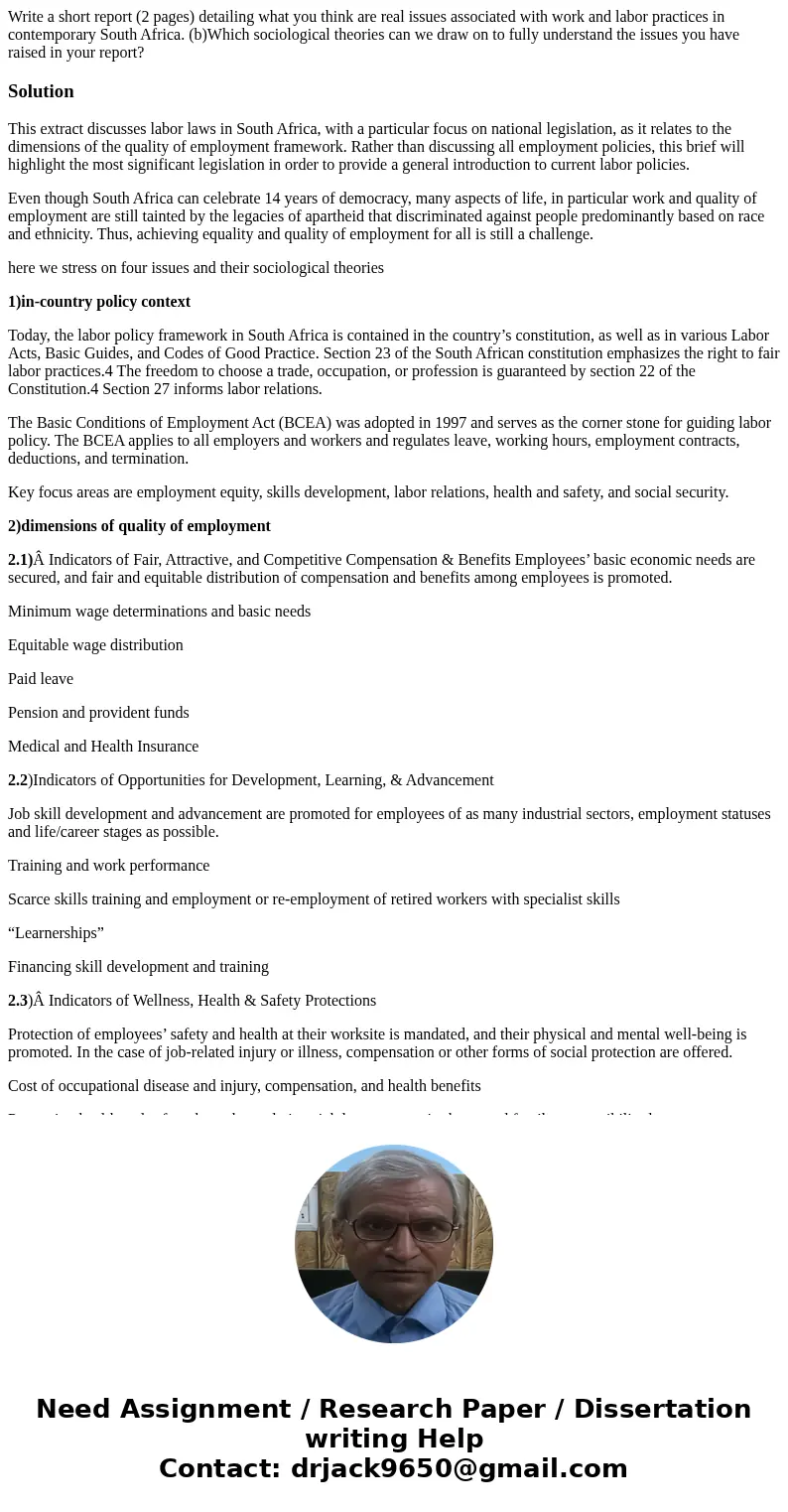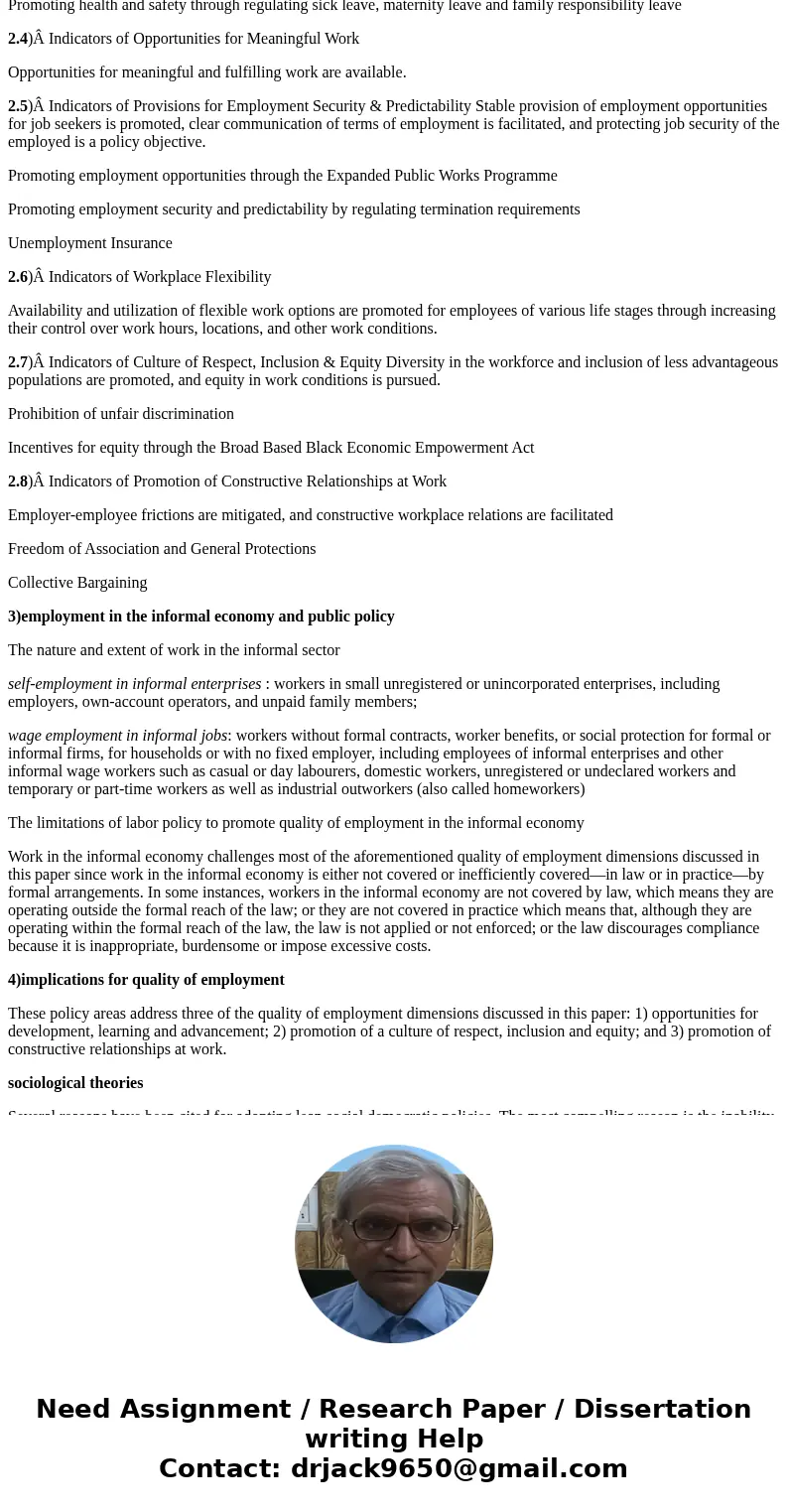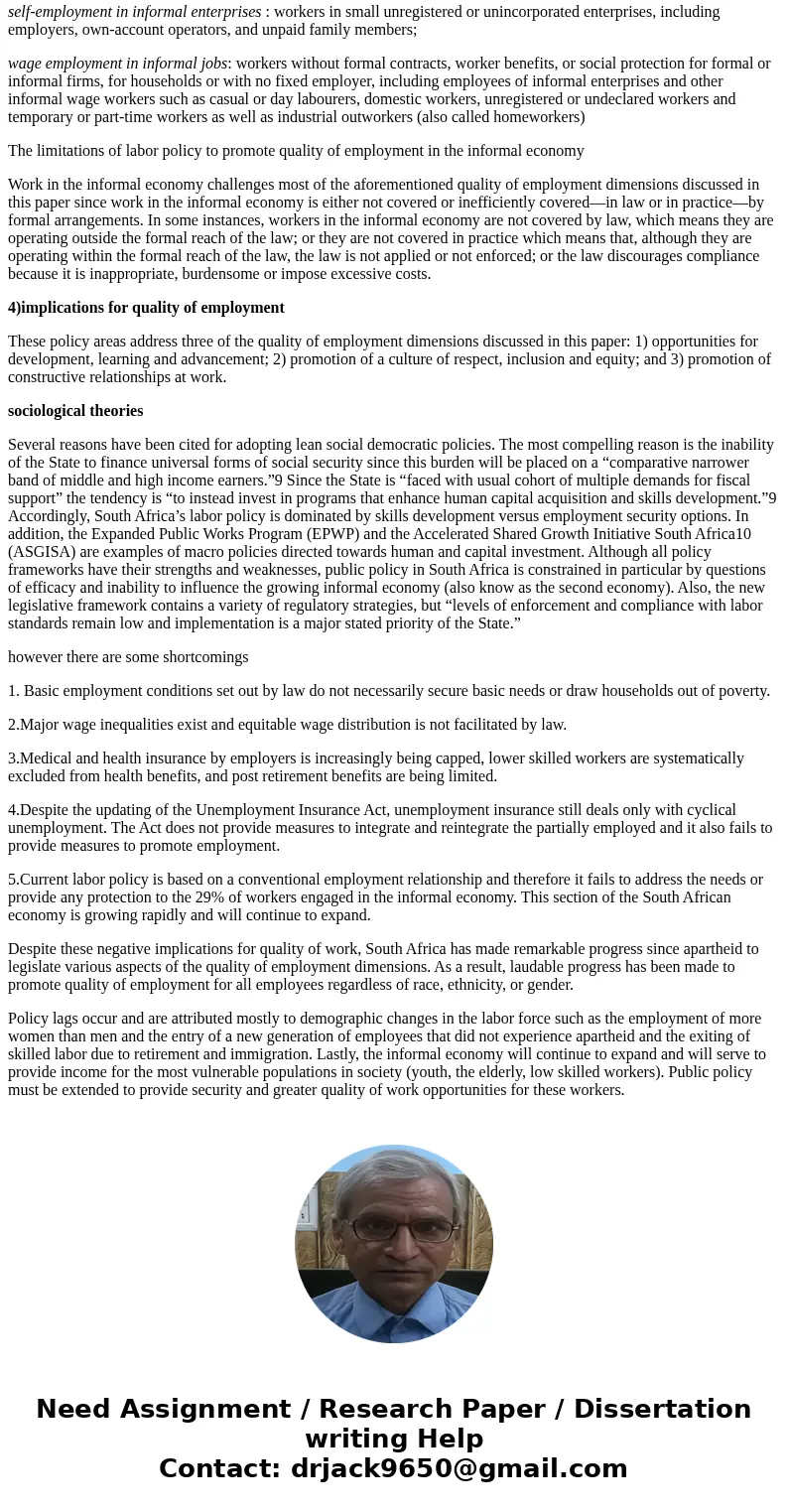Write a short report 2 pages detailing what you think are re
Write a short report (2 pages) detailing what you think are real issues associated with work and labor practices in contemporary South Africa. (b)Which sociological theories can we draw on to fully understand the issues you have raised in your report?
Solution
This extract discusses labor laws in South Africa, with a particular focus on national legislation, as it relates to the dimensions of the quality of employment framework. Rather than discussing all employment policies, this brief will highlight the most significant legislation in order to provide a general introduction to current labor policies.
Even though South Africa can celebrate 14 years of democracy, many aspects of life, in particular work and quality of employment are still tainted by the legacies of apartheid that discriminated against people predominantly based on race and ethnicity. Thus, achieving equality and quality of employment for all is still a challenge.
here we stress on four issues and their sociological theories
1)in-country policy context
Today, the labor policy framework in South Africa is contained in the country’s constitution, as well as in various Labor Acts, Basic Guides, and Codes of Good Practice. Section 23 of the South African constitution emphasizes the right to fair labor practices.4 The freedom to choose a trade, occupation, or profession is guaranteed by section 22 of the Constitution.4 Section 27 informs labor relations.
The Basic Conditions of Employment Act (BCEA) was adopted in 1997 and serves as the corner stone for guiding labor policy. The BCEA applies to all employers and workers and regulates leave, working hours, employment contracts, deductions, and termination.
Key focus areas are employment equity, skills development, labor relations, health and safety, and social security.
2)dimensions of quality of employment
2.1)Â Indicators of Fair, Attractive, and Competitive Compensation & Benefits Employees’ basic economic needs are secured, and fair and equitable distribution of compensation and benefits among employees is promoted.
Minimum wage determinations and basic needs
Equitable wage distribution
Paid leave
Pension and provident funds
Medical and Health Insurance
2.2)Indicators of Opportunities for Development, Learning, & Advancement
Job skill development and advancement are promoted for employees of as many industrial sectors, employment statuses and life/career stages as possible.
Training and work performance
Scarce skills training and employment or re-employment of retired workers with specialist skills
“Learnerships”
Financing skill development and training
2.3)Â Indicators of Wellness, Health & Safety Protections
Protection of employees’ safety and health at their worksite is mandated, and their physical and mental well-being is promoted. In the case of job-related injury or illness, compensation or other forms of social protection are offered.
Cost of occupational disease and injury, compensation, and health benefits
Promoting health and safety through regulating sick leave, maternity leave and family responsibility leave
2.4)Â Indicators of Opportunities for Meaningful Work
Opportunities for meaningful and fulfilling work are available.
2.5)Â Indicators of Provisions for Employment Security & Predictability Stable provision of employment opportunities for job seekers is promoted, clear communication of terms of employment is facilitated, and protecting job security of the employed is a policy objective.
Promoting employment opportunities through the Expanded Public Works Programme
Promoting employment security and predictability by regulating termination requirements
Unemployment Insurance
2.6)Â Indicators of Workplace Flexibility
Availability and utilization of flexible work options are promoted for employees of various life stages through increasing their control over work hours, locations, and other work conditions.
2.7)Â Indicators of Culture of Respect, Inclusion & Equity Diversity in the workforce and inclusion of less advantageous populations are promoted, and equity in work conditions is pursued.
Prohibition of unfair discrimination
Incentives for equity through the Broad Based Black Economic Empowerment Act
2.8)Â Indicators of Promotion of Constructive Relationships at Work
Employer-employee frictions are mitigated, and constructive workplace relations are facilitated
Freedom of Association and General Protections
Collective Bargaining
3)employment in the informal economy and public policy
The nature and extent of work in the informal sector
self-employment in informal enterprises : workers in small unregistered or unincorporated enterprises, including employers, own-account operators, and unpaid family members;
wage employment in informal jobs: workers without formal contracts, worker benefits, or social protection for formal or informal firms, for households or with no fixed employer, including employees of informal enterprises and other informal wage workers such as casual or day labourers, domestic workers, unregistered or undeclared workers and temporary or part-time workers as well as industrial outworkers (also called homeworkers)
The limitations of labor policy to promote quality of employment in the informal economy
Work in the informal economy challenges most of the aforementioned quality of employment dimensions discussed in this paper since work in the informal economy is either not covered or inefficiently covered—in law or in practice—by formal arrangements. In some instances, workers in the informal economy are not covered by law, which means they are operating outside the formal reach of the law; or they are not covered in practice which means that, although they are operating within the formal reach of the law, the law is not applied or not enforced; or the law discourages compliance because it is inappropriate, burdensome or impose excessive costs.
4)implications for quality of employment
These policy areas address three of the quality of employment dimensions discussed in this paper: 1) opportunities for development, learning and advancement; 2) promotion of a culture of respect, inclusion and equity; and 3) promotion of constructive relationships at work.
sociological theories
Several reasons have been cited for adopting lean social democratic policies. The most compelling reason is the inability of the State to finance universal forms of social security since this burden will be placed on a “comparative narrower band of middle and high income earners.”9 Since the State is “faced with usual cohort of multiple demands for fiscal support” the tendency is “to instead invest in programs that enhance human capital acquisition and skills development.”9 Accordingly, South Africa’s labor policy is dominated by skills development versus employment security options. In addition, the Expanded Public Works Program (EPWP) and the Accelerated Shared Growth Initiative South Africa10 (ASGISA) are examples of macro policies directed towards human and capital investment. Although all policy frameworks have their strengths and weaknesses, public policy in South Africa is constrained in particular by questions of efficacy and inability to influence the growing informal economy (also know as the second economy). Also, the new legislative framework contains a variety of regulatory strategies, but “levels of enforcement and compliance with labor standards remain low and implementation is a major stated priority of the State.”
however there are some shortcomings
1. Basic employment conditions set out by law do not necessarily secure basic needs or draw households out of poverty.
2.Major wage inequalities exist and equitable wage distribution is not facilitated by law.
3.Medical and health insurance by employers is increasingly being capped, lower skilled workers are systematically excluded from health benefits, and post retirement benefits are being limited.
4.Despite the updating of the Unemployment Insurance Act, unemployment insurance still deals only with cyclical unemployment. The Act does not provide measures to integrate and reintegrate the partially employed and it also fails to provide measures to promote employment.
5.Current labor policy is based on a conventional employment relationship and therefore it fails to address the needs or provide any protection to the 29% of workers engaged in the informal economy. This section of the South African economy is growing rapidly and will continue to expand.
Despite these negative implications for quality of work, South Africa has made remarkable progress since apartheid to legislate various aspects of the quality of employment dimensions. As a result, laudable progress has been made to promote quality of employment for all employees regardless of race, ethnicity, or gender.
Policy lags occur and are attributed mostly to demographic changes in the labor force such as the employment of more women than men and the entry of a new generation of employees that did not experience apartheid and the exiting of skilled labor due to retirement and immigration. Lastly, the informal economy will continue to expand and will serve to provide income for the most vulnerable populations in society (youth, the elderly, low skilled workers). Public policy must be extended to provide security and greater quality of work opportunities for these workers.



 Homework Sourse
Homework Sourse